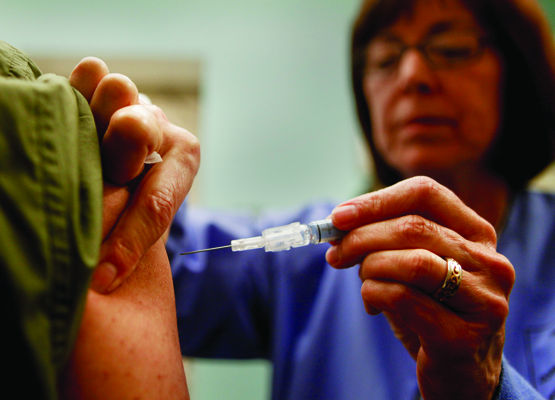Welcome Back: Vaccination exemptions cause controversy

August 19, 2014
In first-world countries such as the United States, worries about preventable disease epidemics are few and far between, thanks to vaccines. Recently, members of the anti-vaccine movement are stirring up those worries again by refusing to vaccinate their children against preventable diseases.
Supporters of the anti-vaccine movement choose not to be vaccinated, often due to concerns about side effects and religious or ethical reasons.
Many base their support upon the belief that vaccines could cause autism. In the late 1990s, British researcher Andrew Wakefield published a fraudulent study claiming a link between autism and the measles, mumps and rubella vaccine, prompting the scare.
According to the Centers for Disease Control and Prevention, “autism spectrum disorder is not associated with immunological stimulation from vaccines during the first two years of life.” Previous studies like Wakefield’s that supported the belief that vaccines cause autism have been recalled, and the theory has been largely disproven.
Derek Bartholomous, 44, founder of Anti-Vaccine Body Count, is a passionate supporter of vaccines. A post-production producer in the entertainment industry who lives in Los Angeles, Bartholomous created the website to inform the public of the number of deaths caused by going without vaccines.
He created the page in 2009, and its address, Jennymccarthybodycount.com, takes a jab at actress and comedian Jenny McCarthy, a strong, vocal supporter of the anti-vaccine movement.
According to Bartholomous, measles — a disease declared to be eliminated from the United States in 2000 — has manifested in 554 people from Jan. 1 to July 3 of this year due to 17 outbreaks.
“All of these outbreaks are the direct result of unvaccinated people,” Bartholomous said.
Some people feel that people who choose whether or not to vaccinate their children is nobody else’s business. Bartholomous does not feel that way.
Although he does not personally know anyone who has been affected by a preventable illness, Bartholomous still sees this cause as personal.
“I do not wish for anyone to suffer from a preventable disease. We have the ability to prevent so many more diseases today than we could just a few years ago,” Bartholomous said.
Bartholomous’s thinking is disputed in places like the ThinkTwice Global Vaccine Institute, which provides access to educational resources about vaccines.
Created in 1996, the institute works to allow people to come to their own conclusions on the safety of vaccines and then decide for themselves whether or not they should vaccinate.
Neil Miller, the director of the institute, said he is not anti-vaccine but is opposed to “compulsory vaccination.”
“Parents are entitled to a full disclosure of pertinent data from all available sources and freedom to choose whether or not to vaccinate their children,” Miller said.
Miller said he believes that other people’s decisions on vaccinating their children is not his business.
Some anti-vaccine proponents state that one of the reasons they believe vaccines are so harmful is that there are too many given in too little time.
“Regarding the number of vaccines given, I did co-author a study that confirmed the hazards of giving too many vaccines simultaneously. Babies that receive the most vaccines tend to have higher (worse) hospitalization and death rates,” Miller said.
One of Pitt’s many accolades deals with vaccinations.
Jonas Salk, inventor of the polio vaccine, and his team performed their work here in the 1940s and ’50s. Members of the anti-vaccine movement are denouncing creations such as Salk’s and calling vaccines dangerous.
Julius Youngner, now 93, was one of the scientists who helped create this vaccine from 1950 to 1955. He had a hand in changing history, and not only through creating a vaccine — Youngner was also part of the Manhattan Project, the project that created the first atomic bombs during WWII.
Youngner is an expert in vaccines, and he has a diverse scientific background.
“I was an integral part of the whole process from the beginning,” Youngner said. “I devised cell culture that made it possible to grow large amounts of polio virus, enough to make a vaccine.”
Youngner said McCarthy’s case and the anti-vaccine movement are not based in science.
“The fact that [the anti-vaccine movement] has taken place is a very negative factor in the health of children and the spread of disease. It’s not fair for kids to not be vaccinated because their mothers are afraid,” Youngner said.
He said schools should insist that parents vaccinate their children and allow exemptions only for religious reasons.
The common assumption is that children must be vaccinated in order to go to school, but in some cases, vaccines are not mandatory.
This is the case with Pittsburgh Public Schools.
“If [the parents] say they don’t morally or religiously want to get them, we honor that and [the children] come to school,” Rae-Ann Green, coordinator of health services at the Pittsburgh Public Schools, said.
This occurs with employees as well as students, and it also occurs with parents who have previously vaccinated their children but are no longer willing to.
At Pitt, several vaccinations are required just to attend the University, with an additional vaccination needed in order to live on campus.
Pitt spokesperson John Fedele said students are required to have immunizations for measles, mumps and rubella. Students living on campus must additionally have the meningitis vaccine.
The University does offer exemptions for religious reasons but encourages students to vaccinate beyond the requirements for diseases such as chicken pox, whooping cough and hepatitis A and B.
Pitt also offers free flu shots for its students, of which about 3,500 students take advantage.
At a time when some are questioning the safety of the vaccines that keep us healthy, Youngner has no regrets over helping create one of the most important vaccines we have.
“It was an important and exciting time in my scientific life, and I have an enormous amount of pride in what we did,” he said.


